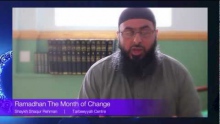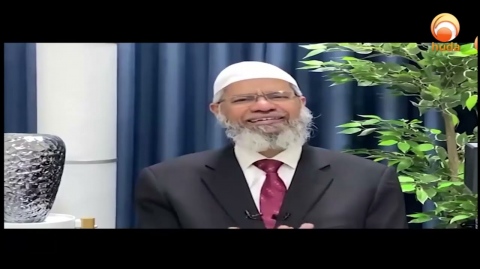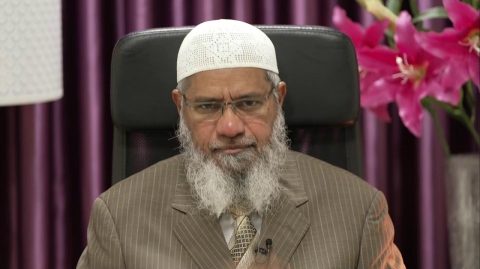MUST WATCH - Most Common Errors committed by Muslims during Ramadan - Dr Zakir Naik 2012
14 years ago
17:17
13,497 views
The common errors committed by the Muslims in the month of Ramadan can be broadly classified into 4 categories:
The 1st category is – common errors committed by the Muslims regarding the obligatory rules and regulations of fasting.
The 2nd category is – the common errors committed by the Muslims which are contradictory to the Sunnah of fasting.
The 3rd category is – the errors committed by the Muslims mainly due to neglecting the obligatory duties in Islam and indulging in acts which are prohibited.
4th category is – other common errors committed my Muslims in the month of Ramadan. These categories will be discussed in detail in next episodes….
The errors committed regarding the 1st category i.e. regarding the obligatory rules and regulations of fasting, the most common is that
Muslims manier times don’t do the niyaah (intention) of the fasting, intention is very important, without intention without niyaah, the fasting is not accepted. So making intention is obligatory. And we will be discussing it in detail inshallah in next episode.
The second error is that many Muslims even after fajar azaan has started they continue eating and they think that end of sahoor time is only at the end of fajar azaan. Infact the moment the fajar azaan starts, the moment the beginning of dawn starts the sahoor time ends, so this is the error which nullifies the fast.
Many people they delay paying their Zakat-ul-Fitir. And manier times they pay after the Eid-ul-Fitir Salaah. If we pay the Zakat-ul –Fitir after Eid Salaah then it will be like normal charity. It does not come under Zakat-ul-Fitir.
so these three are most grievous in 1st category.
The common errors committed in 2nd category i.e. which are contradictory to the Sunnah of the fasting is
Many people they skip the sahoor.
Some people have an early sahoor i.e. they have the sahoor one or two hours before the fajar time. Infact sahoor is a blessing, every muslim should have it. And the prophet said, "we should delay the sahoor as much as possible". we should have it just before the fajar time.
Many Muslims delay opening the fast, they delay iftaar and Prophet Muhammad (peace be upon him) said, "The people will be good as long as they hasten in breaking the fast" that means immediately after sunset they should break their fast.
Many Muslims read un-authentic Dua during iftaar. The most authentic Dua as far as iftaar is concerned is "zehbah zamaha wa-abtil-latil urooqu wasa-bata ajar inshallah". That means "my thirst is quenched, veins are moistened and the reward is written god willing".
And some people who read this dua when breaking the fast, they say it before breaking the fast. Before they put date in their mouth, they say it and it is contrary to the meaning. The meaning says that my thirst has been quenched and the veins have been moistened. So your thirst cannot be quenched before breaking the fast. So normally it is should be said after you eat the ‘khajoor’ after your water and you are satisfied, maybe after few minutes when you break the fast, then you read this dua.
Many Muslims eat excessively during iftaar and many of them eat throughout the night.
Many of them are negligent as far as taraweeh is concerned, because taraweeh is not a fardh so they think it is no problem if a Muslim missed taraweeh, though taraweeh is not a fardh it is a very important sunnah. And a muslim who missed taraweeh is missing a great deal of reward.
Many Muslims who perform taraweeh they read taraweeh very fast – 100 miles/hour. They try to finish in a short time and they defeat the purpose in fact you should read it at a moderate pace so that people will understand and they grasp the message of Allah subhanwatala.
Those who go for itakaaf in the mosque many of them socialise during itakaaf as though it is a time to meet people and friends. It is totally contradictory to sunnah.
Many of the Muslims think that the 'laylatul qadar' (night of power) is on the 27th night of Ramadan and they only worship Allah subhanwatala in this night. Infact our beloved Prophet Muhammad (peace be upon him) said, "search for the lylatul qadar in the odd nights of the last ten days". So lylatul qadar can fall on 21st, 23rd, 25th, 27th or 29th.
They spend their time in ramadan in unproductive work rather than spending in dhikir and worshipping Allah subhanwatala. Also they should spend time in offering besides the compulsory salaah, the nawafil – the voulantary salaah and the sunnah salaah.
They should do dua
They should ask for forgiveness, this is the month of forgiveness.
They should read the Quran as much as possible, to get the blessing of Allah subhanwatala
They fast and keep themselves hungry but basically they are nor mentally prepared for their fast and it as though they are staying hungry, but the main purpose of fasting is to aquire Taqwah (God consciousness, piety).
The 1st category is – common errors committed by the Muslims regarding the obligatory rules and regulations of fasting.
The 2nd category is – the common errors committed by the Muslims which are contradictory to the Sunnah of fasting.
The 3rd category is – the errors committed by the Muslims mainly due to neglecting the obligatory duties in Islam and indulging in acts which are prohibited.
4th category is – other common errors committed my Muslims in the month of Ramadan. These categories will be discussed in detail in next episodes….
The errors committed regarding the 1st category i.e. regarding the obligatory rules and regulations of fasting, the most common is that
Muslims manier times don’t do the niyaah (intention) of the fasting, intention is very important, without intention without niyaah, the fasting is not accepted. So making intention is obligatory. And we will be discussing it in detail inshallah in next episode.
The second error is that many Muslims even after fajar azaan has started they continue eating and they think that end of sahoor time is only at the end of fajar azaan. Infact the moment the fajar azaan starts, the moment the beginning of dawn starts the sahoor time ends, so this is the error which nullifies the fast.
Many people they delay paying their Zakat-ul-Fitir. And manier times they pay after the Eid-ul-Fitir Salaah. If we pay the Zakat-ul –Fitir after Eid Salaah then it will be like normal charity. It does not come under Zakat-ul-Fitir.
so these three are most grievous in 1st category.
The common errors committed in 2nd category i.e. which are contradictory to the Sunnah of the fasting is
Many people they skip the sahoor.
Some people have an early sahoor i.e. they have the sahoor one or two hours before the fajar time. Infact sahoor is a blessing, every muslim should have it. And the prophet said, "we should delay the sahoor as much as possible". we should have it just before the fajar time.
Many Muslims delay opening the fast, they delay iftaar and Prophet Muhammad (peace be upon him) said, "The people will be good as long as they hasten in breaking the fast" that means immediately after sunset they should break their fast.
Many Muslims read un-authentic Dua during iftaar. The most authentic Dua as far as iftaar is concerned is "zehbah zamaha wa-abtil-latil urooqu wasa-bata ajar inshallah". That means "my thirst is quenched, veins are moistened and the reward is written god willing".
And some people who read this dua when breaking the fast, they say it before breaking the fast. Before they put date in their mouth, they say it and it is contrary to the meaning. The meaning says that my thirst has been quenched and the veins have been moistened. So your thirst cannot be quenched before breaking the fast. So normally it is should be said after you eat the ‘khajoor’ after your water and you are satisfied, maybe after few minutes when you break the fast, then you read this dua.
Many Muslims eat excessively during iftaar and many of them eat throughout the night.
Many of them are negligent as far as taraweeh is concerned, because taraweeh is not a fardh so they think it is no problem if a Muslim missed taraweeh, though taraweeh is not a fardh it is a very important sunnah. And a muslim who missed taraweeh is missing a great deal of reward.
Many Muslims who perform taraweeh they read taraweeh very fast – 100 miles/hour. They try to finish in a short time and they defeat the purpose in fact you should read it at a moderate pace so that people will understand and they grasp the message of Allah subhanwatala.
Those who go for itakaaf in the mosque many of them socialise during itakaaf as though it is a time to meet people and friends. It is totally contradictory to sunnah.
Many of the Muslims think that the 'laylatul qadar' (night of power) is on the 27th night of Ramadan and they only worship Allah subhanwatala in this night. Infact our beloved Prophet Muhammad (peace be upon him) said, "search for the lylatul qadar in the odd nights of the last ten days". So lylatul qadar can fall on 21st, 23rd, 25th, 27th or 29th.
They spend their time in ramadan in unproductive work rather than spending in dhikir and worshipping Allah subhanwatala. Also they should spend time in offering besides the compulsory salaah, the nawafil – the voulantary salaah and the sunnah salaah.
They should do dua
They should ask for forgiveness, this is the month of forgiveness.
They should read the Quran as much as possible, to get the blessing of Allah subhanwatala
They fast and keep themselves hungry but basically they are nor mentally prepared for their fast and it as though they are staying hungry, but the main purpose of fasting is to aquire Taqwah (God consciousness, piety).
Show moreShow less
First category - The Common Errors Comitted by Muslims regarding the obligatory rules and regulation of Fasting.
Secound category - The Common Errors Comitted by Muslims which are contradicting to the Sunnah of Fasting.
Third category - The Common Errors Comitted by Muslims mainly due to neglecting the obligatory duties in Islam and indulging in acts which are prohibited.
Fourth category - The Other Common Errors Comitted by Muslims in the month of Ramdan.
..
Ramadhan A Date With Dr Zakir.
Secound category - The Common Errors Comitted by Muslims which are contradicting to the Sunnah of Fasting.
Third category - The Common Errors Comitted by Muslims mainly due to neglecting the obligatory duties in Islam and indulging in acts which are prohibited.
Fourth category - The Other Common Errors Comitted by Muslims in the month of Ramdan.
..
Ramadhan A Date With Dr Zakir.


 English
English Български
Български No filter
No filter











